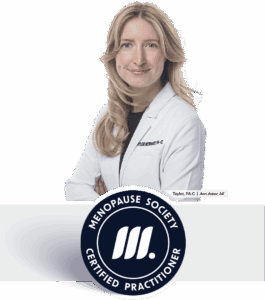Menopause & Sleep: Why Nights Are Harder After 50 (and How to Fix It)
Sleepless nights aren’t “just part of getting older.” They’re treatable.
If you’ve ever tossed and turned at 2 a.m., drenched in a hot flash or wide awake for no reason at all, you’re not alone. Sleep disruption is one of the most common complaints we hear from women in Ann Arbor going through menopause. And while it’s often dismissed as “normal,” poor sleep isn’t something you just have to accept—it’s a medical symptom with real solutions.
Why Menopause Wreaks Havoc on Sleep
During perimenopause and menopause, shifting hormone levels—especially estrogen and progesterone—directly affect your sleep cycles. These changes can:
- Trigger night sweats and hot flashes that wake you suddenly.
- Lower progesterone, a hormone that naturally promotes calm and deep sleep.
- Disrupt melatonin production, making it harder to fall and stay asleep.
- Lead to mood changes and anxiety that add another layer of restlessness.
Many women in Ann Arbor tell us they’ve tried herbal supplements, over-the-counter sleep aids, or even prescription medications, but the results are short-lived. That’s because without addressing the underlying hormone imbalance, sleep struggles continue.
Meet Taylor, PA-C: Menopause Society Certified Provider
At RegenCen Ann Arbor, women benefit from the expertise of Taylor, PA-C, a Menopause Society Certified Provider (MSCP)—a credential held by only a select number of providers nationwide.

Taylor has advanced training in the diagnosis and treatment of menopause-related conditions, with a special focus on sleep disruption, brain fog, weight changes, and intimacy concerns. Her approach is both medical and personal: she listens to each patient’s unique experience, validates their symptoms, and builds a treatment plan that feels practical, safe, and effective.
“Sleep is foundational to everything—energy, mood, focus, and even long-term health. My goal is to help women move beyond ‘just getting through it’ and back to truly restorative rest.” – Taylor, PA-C
What Patients Are Saying
At RegenCen Ann Arbor, patients notice the difference in how care is delivered.
One recent patient shared:
“Excellent care. Everything was explained in detail and I did not have the feeling that my caregiver was under pressure to go faster.”
This reflects our philosophy: menopause treatment isn’t just about prescriptions—it’s about unhurried, compassionate care that makes you feel heard, respected, and supported every step of the way.
The RegenCen Ann Arbor Approach
With a consult-first model, we start by identifying your hormone levels and the patterns affecting your sleep. Then, we design a treatment plan tailored to you.
Our sleep-focused menopause treatment may include:
- Bioidentical hormone replacement therapy (BHRT): Restores estrogen and progesterone, supporting more natural, restorative sleep.
- Targeted wellness support: Nutritional guidance and stress management strategies that improve sleep quality.
- Ongoing monitoring & adjustments: Because every woman’s needs change over time, we refine your treatment to keep you sleeping well long-term.
Our Ann Arbor medical team is also guided by Dr. Gustav Lo, MD, RegenCen’s Founder and Chief Medical Officer, who brings 30+ years of experience in hormone health and longevity medicine. Together, Dr. Lo and Taylor provide a level of menopause care not typically found in primary care or OB/GYN settings.
Why Ann Arbor Women Choose RegenCen
Whether you’re an early riser running through Nichols Arboretum or balancing a career at the University of Michigan, quality sleep is essential. Poor sleep doesn’t just cause fatigue—it impacts mood, weight, relationships, and even long-term health.
At RegenCen Ann Arbor, patients come from Burns Park, Kerrytown, Old West Side, Ypsilanti, Saline, and Dexter for care that’s both local and personalized. With menopause-focused providers on your side, restful nights aren’t just possible—they’re expected.
FAQs: Menopause & Sleep
Is poor sleep the first sign of menopause?
For some women, yes. Insomnia and night sweats often show up in perimenopause, even before periods stop.
Will hormone therapy really help me sleep?
Most women notice improvements within weeks. By restoring balance, BHRT reduces night sweats, calms the nervous system, and promotes deeper sleep.
Can stress and lifestyle make sleep worse?
Absolutely. Stress, caffeine, alcohol, and Michigan winters can all compound symptoms. That’s why our approach combines medical treatment with practical lifestyle support.
Ready to Sleep Better Again?
If you’re lying awake night after night, you don’t have to just “deal with it.” Relief from menopause-related sleep issues is possible—and it starts with a consultation where you’ll never feel rushed.
📍 RegenCen Ann Arbor
315 E Eisenhower Pkwy, Suite 8, Ann Arbor, MI 48108
📞 Call or text: (734) 794-3786
